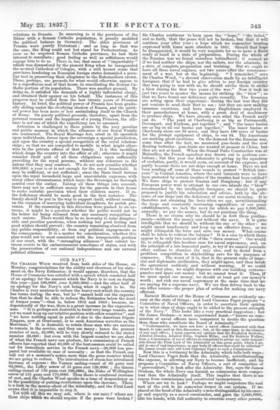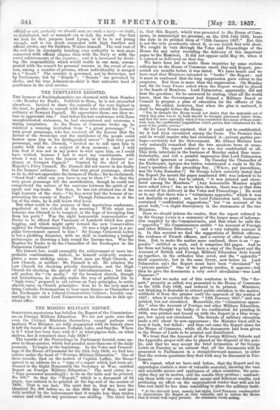OUR NAVY.
Six CHARLES WOOD received from both sides of the House, on Monday, congratulations for the ability and clearness of his statement on the Navy Estimates : it would appear, therefore, that the House of Commons was satisfied with a speech which consisted half of an apology for the amount. which the Navy is to cost us during this year—just 100,0001. over 8,000,0001.—and the other half of an apology for the Navy's not being what it ought to be. Sir Charles is very anxious to reduce the heavy cost which the country has borne during the war, but he "cannot hold out the expectation that he shall be able to reduce the Estimates below the level of former years"—that is, below 1852 and 1853; because, independently of the war, there is a great increase in the expensiveness. "It is perhaps not desirable to build very large vessels, and yet we must keep up our relative position with other countries " ; and we have nothing equal in point of size to the American frigate Niagara, now at Gravesend, or to such American corvettes as the Merrimac." It is desirable to retain those men who are anxious to remain in the service, and they are many ; hence the present number of men, 53,000, will be very slowly reduced to the stated number 39,000: but even with the largest number we are short of what the French navy can produce, for a commission of French officers has reported that 40,000 of the best seamen Gould be called out for immediate service in the French navy-20,000 less prepared but available in ease of necessity ; so that the French can call out at a moment's notice more than the gross number which we are going to reduce. The introduction of steam has introduced increase of expense : the Vernon sailing-vessel of 60 guns cost 63,000/., the Liffey screw of 51 guns cost 129,000/. ; the Queen sailing-vessel of 116 guns cost 100,000/., the Duke of Wellington screw of 131 guns cost 170,000/. Thus there is continual increase of cost, and Sir Charles Wood speaks in a tone of despondency as to the possibility of putting restrictions upon the increase. There is a leak in the money-chest of the Admiralty, and the First Lord avows that it is impossible to stop it. Yet with all this we may ask, where is our navy ? where are those ships which we should require if the peace were broken ? Sir Charles continues to harp upon the "hope," "the belief," and so forth, that the peace will not be broken, but that it will continue year after year ; a hope which we remember hearing expressed with tones more absolute in 1851. Should that hope be disappointed, it would be very requisite for us to have a fleeet ready at hand in a state of preparation. Daring the whole of the Russian war we found ourselves behindhand ; it seemed asif we had neither the ships, nor the sailors, nor the admirals, in a state of complete preparation and training. But we ought to have all these naval engines, not two years after the commencement of a war, but at the beginning. " I remember," says Sir Charles Wood, "a shrewd observation made by an intelligent foreigner, that if he had to give advice to any foreign country that was going to war with us, he should advise them to strike a blow during the first two years of the war." Now it took us just two years to muster the means for striking the " blow " ; so that we have found our deficiency quite recently. The Russians are acting upon their experience : during the last war they did not venture to send their fleet to sea ; but they are now making immense exertions, and have many Englishmen employed in their manufactures at home, with a great deal of machinery to produce ships. We have already seen what the French navy can do. "The yard at Cherbourg is as big as Portsmouth, Devonport, and Keyham, put together " ; and "the inner basins are as big as all our basins put together." The inner basins at Cherbourg alone are 33 acres and they have 180 acres of basins for the prompt equipment Of ships, to our 34. The Americans are making great exertions. On the demand for the Russian war, some time after the fact, we mustered gun-boats and tho new floating batteries : gun-boats are wanted at present in China, but they are not at hand. When the Grand Duke Constantine was at Marseilles, the French squadron was drawn out to perform evolutions; but this year our Admiralty is giving up the squadron of evolution, partly, it would seem, on account of the expense, and partly because there are not ships enough at home. Have we not been sending off some of those vessels to protect " British interests" in Central America, where the said interests were to have been protected by certain treaties if the treaties had been ratified?' We have ships to protect 'Wotan and Hongkong ; but if any European power were to attempt in our own islands the "blow " recommended by the intelligent foreigner, we should be quite prepared to justify his calculation and advice, both by the absence of our ships and the deficiency of our naval training. It is therefore not straining the facts when we say, notwithstanding the largo and constantly increasing expenditure of our peace establishments, we lack the navy for which we pay 8,000,0001. annually; we pay the money, but do not purchase the thing. There is no reason why we should be in both these predicaments—without the money and without the navy. It is quite intelligible that we should be without the one or the other : we might spend handsomely and keep up an effective force' or we might relinquish the force and save our money. What course shall be taken to redress the balance ? It is a ease in which thereappear to be only two instead of the "three courses." One would be, to relinquish this bootless race for naval supremacy, and, on the principle of a late lamented party, to try if we cannot persuade other nations to abandon the race also, and to desist from a profitless competition in shipbuilding save for the purposes of commerce. The worst of it is, that in the present state of imperial and diplomatic civilization, they might agree, and then break the agreement suddenly and without warning. If we could trust to that plan, we might dispense with our building extrava- gancies and spare our money : but we cannot trust it. Then, if we must spend our money, we should at least get our money's worth ; not risk our naval supremacy at the same time that we are paying for a supreme navy. We are thus driven back to the one other course—the proper plan of action for making our navy efficient.
Earnest Members of the House of Commons are evidently uneasy at the state of things ; and Lord Clarence Paget proposes "a Committee of Naval Officers, in order to' ascertain their opinion
as to what class of ships ought to be added to the present strength of the Navy." This looks like a very practical suggestion ; but Sir James Graham—a most experienced hand—" knows no commission of naval officers more competent to decide the question, than those who constitute the Board of Admiralty." "Unfortunately, we have not. here a naval officer connected with that Board, to take part in this discussion ; but, at the same time, in the absence, of any such officer, I must express my opinion that Sir Frederick Berkeley, Admiral Dundas, Admiral Eden, Captain Milne, and Sir Baldwin Walker, form a Commission of naval officers as competent to advise my right honourable friend the First Lord of the Admiralty on this great point, which I admit is one of vast importance, as any body of officers that could be collected." Sir James would only add Lord Clarence Paget to such a Commission.
Now this is a testimony to the Admiralty which tells both ways : Lord Clarence Paget finds that the Admiralty, notwithstanding the expense, is allowing our Navy to become inefficient, and he proposes a Committee of Naval Officers, a sort of committee of " provveditori," to look after the Admiralty. But, says Sir James Graham the whole Navy can furnish no commission more competent than the Admiralty itself. This implies that there is no rescue from commissions and constituted incompetence.
Where are we to look ? Perhaps we might conjecture the real root of the evil to lie somewhat deeper in our system. If we placed at the head of the Admiralty a man distinguished by his energy and capacity as a naval commander, and gave the 8,000,0001, into his hands, with full authority to override every other person, official or not, probably we should soon see such a navy—so built, 60 distributed, and so manned—as to defy the world. Say that we took for that purpose Lord Lyons, or if he is not young enough, and is too much connected with high families and official circles, say Sir Baldwin Walker himself. The real root of the evil lies in constantly, handing over authority to men more connected with official cliques than with the Navy or with the naval aehievements of the country; and it is increased by dividing the responsibility, which would reside in one man, accompanied with the reward for personal renown in the event of success, among a number of persons, whose individuality is merged in a "Board." The country is governed, not by Sovereign, not by Parliament, but by " Boards "; " Boards " are governed by clerks, and the true Admiral-in-chief is that unknown herd of gentlemen in the civil service.



























 Previous page
Previous page